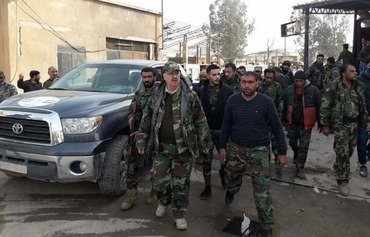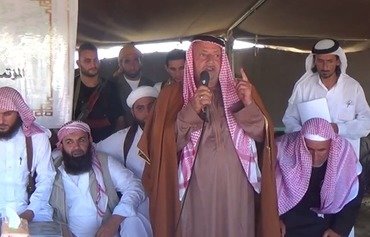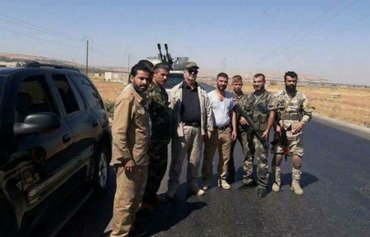Iran's Islamic Revolutionary Guard Corps (IRGC) has established a new tribal militia in Syria's south-eastern desert region as part of an attempt to gain control over the tri-border area, Syrian activists told Diyaruna.
The new tribal militia will support the Syrian regime's military operations in the Badiya region, which extends from the outskirts of Damascus to the Jordanian and Iraqi borders.
These operations are being conducted with the backing of IRGC-affiliated militias such as Lebanon's Hizbullah and the Fatemiyoun Brigade which encompasses Afghan nationals.
Gaining control of al-Tanf crossing with Iraq, which is used by the international coalition as a base for the co-ordination of airstrikes and training of local forces in the fight against ISIS, appears to be a particular goal of the IRGC and its affiliates.
![Omar al-Hussein, also known as "al-Haj Baqir", who leads the Imam al-Baqir brigade, also serves as the military leader of the new IRGC-backed Syrian tribal mobilisation force. [Photo circulating on social media accounts]](/cnmi_di/images/2017/07/31/8994-omar-hussein-baqir-600_384.jpg)
Omar al-Hussein, also known as "al-Haj Baqir", who leads the Imam al-Baqir brigade, also serves as the military leader of the new IRGC-backed Syrian tribal mobilisation force. [Photo circulating on social media accounts]
![Sheikh Nawaf al-Bashir (R) and al-Haj Baqir on their way to Beirut to meet with Hizbullah and IRGC officials to sign the final agreement on the establishment of the new Syrian al-Hashd force. [Photo circulating on social media accounts]](/cnmi_di/images/2017/07/31/9001-syria-new-militia-600_384.jpg)
Sheikh Nawaf al-Bashir (R) and al-Haj Baqir on their way to Beirut to meet with Hizbullah and IRGC officials to sign the final agreement on the establishment of the new Syrian al-Hashd force. [Photo circulating on social media accounts]
IRGC courts Syrian tribes
"The IRGC won over to its side a number of influential figures in al-Bakara tribe, one of the largest Arab tribes in the Syrian Badiya," said Riyad Shahoud, a Free Syrian Army (FSA) officer operating in the region's Usud al-Sharqiyah.
In particular, the IRGC persuaded al-Bakara tribal leader Sheikh Nawaf al-Bashir to defect from the Syrian opposition, he said.
But the move has sown divisions among the al-Bakara.
"While Nawaf al-Bashir is the leader of al-Bakara tribe, he currently does not have the support of the tribe’s members, elders and sheikhs," al-Bakara tribe member Ahmed al-Salem told Diyaruna.
Many of the tribe’s influential figures are FSA commanders and refuse to be affiliated with the regime or Iran, he explained.
"The course he has taken is not at all in line with that of the tribe," al-Salem said, suggesting that al-Bashir has been exploiting his position to make it seem like the tribe supports the new Iran-backed militia.
"Efforts seem to have failed to persuade Nawaf al-Bashir not to carry out his plan, but removing him from his position as a leader of the tribe requires many arrangements and a general meeting of all tribe sheikhs and elders," he said.
The current response within the tribe has been to discourage members from joining the new militia, he said, noting that so far, only a small number of tribesmen have responded to the call and joined al-Bashir.
Had al-Bashir -- who has been described in local media as an "opportunist" -- obtained the tribe's full blessing, the number of those who would have joined the new militia would have made a real a difference on the ground, he said.
Recruiting Badiya tribesmen
After the death of his father in 1980, al-Bashir assumed leadership of al-Bakara tribe, Syrian journalist Ahmed al-Abdullah told Diyaruna.
A former member of the Syrian parliament, al-Bashir later "was known for his strong opposition to the regime", and was a signatory of the 2005 Damascus Declaration -- issued by major opposition figures critical of the Syrian regime.
Al-Bashir was one of the first tribal leaders to announce his support for the revolution in 2011, and defected to the Turkish-backed opposition in 2012.
He moved to Turkey because he was wanted by the regime, and remained there until the beginning of 2017, when he announced his return to Syria and his renewed support for the regime.
According to al-Abdullah, al-Bashir is exploiting his status as tribal leader to negotiate with and attempt to influence all the tribes of the Badiya.
So far this year, al-Bashir has recruited hundreds of youth into Iran-backed militias fighting alongside the Syrian regime, starting with Imam al-Baqir brigade, led by fellow tribesman Omar al-Hussein, "al-Haj Baqir".
The force took part in a number of battles at the beginning of the year in rural Homs province and rural al-Raqa province, Shahoud, the FSA officer, said.
More recently, it has been participating in the ongoing battles in the Badiya region, where it has clashed with FSA affiliate Jaish Maghawir al-Thawra, and in the battles in Badiya's al-Hammad area.
These battles have been fought on the axes of Bir al-Qasab, Bir Mahroutha, Dakwa and Um Ramam, Shahoud said, adding that the militia has been tasked with securing the Damascus-Baghdad highway.
The strategic highway runs through the tri-border area near al-Tanf crossing.
The Imam al-Baqir brigade and other Iran-backed units fighting in the area take their orders directly from the IRGC's Badiya operations room, named Mazraat al-Emirati in reference to the area in which it is located, he said.
Syrian tribal mobilisation
According to Shahoud, several reliable tribal sources confirmed that al-Bashir had launched a new "Syrian tribal mobilisation" in al-Hasakeh, in the presence of a large number of tribal elders from the Badiya and al-Hasakeh regions.
The force, commonly known as al-Hashd, is akin to the Iran-backed Popular Mobilisation Forces (PMF) in neighbouring Iraq, which are dominated by Iranian-backed militias.
"The upcoming period will witness the merger of other armed factions into the new militia," Shahoud said.
Negotiations are under way with Suqour al-Sahraa, a pro-regime tribal militia funded by Ayman Jaber, which is attached to the Syrian army’s 5th Corps but has maintained financial and tribal independence, he said.
Al-Baqir brigade's commander is to serve as the field and military official in charge of the Syrian tribal mobilisation, Shahoud said, adding that preparations are under way to assign other prominent figures leadership roles.
Among them is Hamza al-Hassan, also known as "Abu al-Abbas", who currently serves as the commander of al-Baqir brigade's special forces.
"IRGC officers are directly overseeing the training camps set up for the tribesmen, which are concentrated in al-Hasakeh" and in the desert near Palmyra, al-Hasakeh media activist Ammar Saleh told Diyaruna.
At the training camps -- which include Brigade 156, Security Belt and Jabal Kawkab -- co-ordination with the IRGC is done through Ali Hawas al-Khaleef, an al-Tai tribe member who is close to Nawaf al-Bashir, he said.
Since the Syrian regime handed over control of al-Seen airbase to the IRGC, armament and training operations have picked up pace, Saleh said, and the movement of IRGC officers has been observed on a more regular basis.
Saleh said al-Hashd is under a split command, with Nawaf al-Bashir serving as its political leader and al-Haj Baqir as its military leader.
"This was agreed upon in the southern suburb in Beirut under the supervision and in the presence of Lebanese Hizbullah and IRGC commanders," he said.

![Elements of the Imam al-Baqir brigade, which constitutes the nucleus of the new Syrian al-Hashd militia fighting alongside the regime and the IRGC in the Badiya region, pose for a picture. [Photo circulating on social media accounts]](/cnmi_di/images/2017/07/31/8946-Syria-Baqir-brigade-600_384.jpg)






